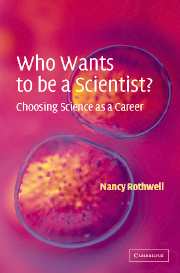Book contents
- Frontmatter
- Contents
- Preface
- 1 Introduction
- 2 Starting out in research
- 3 Getting down to research
- 4 Scientific ethics and conduct
- 5 Publish or perish?
- 6 Communication and getting known
- 7 Moving up
- 8 Responsibilities
- 9 Funding research
- 10 Who owns science?
- 11 Science and the public
- 12 Power, pressure and politics
- 13 Social aspects of science
- 14 So who does want to be a scientist?
- Index
10 - Who owns science?
Published online by Cambridge University Press: 06 July 2010
- Frontmatter
- Contents
- Preface
- 1 Introduction
- 2 Starting out in research
- 3 Getting down to research
- 4 Scientific ethics and conduct
- 5 Publish or perish?
- 6 Communication and getting known
- 7 Moving up
- 8 Responsibilities
- 9 Funding research
- 10 Who owns science?
- 11 Science and the public
- 12 Power, pressure and politics
- 13 Social aspects of science
- 14 So who does want to be a scientist?
- Index
Summary
Tell everyone everything you know.
Who owns science seems like a simple question, but the answers can be complex and varied depending on the situation. As a student or post-doc you might believe that you and your boss (supervisor or lab head) jointly own the results, as a company employee it will seem obvious that the company has ownership (in most cases that is how they make their money) and as an independent scientist in academia the common belief is that the results are yours. In fact there are many stakeholders, particularly in academic research. The scientist who had the ideas, secured funding, supervised the work and inevitably analysed and disseminated (e.g. published) the results is of course a major stakeholder. But so too is the host institution which provides the facilities and support and often the salary of the scientist. The funding bodies (of which there may be several) may also have a claim on ownership. In most cases these issues do not matter. You, as the scientist and your team, will publish the results and use them as you see necessary for securing future funds, developing new hypotheses and plans, submitting for higher degrees or presenting at meetings. It does, however, matter when the findings have potential commercial value and can be exploited, when patents may be filed or when agreements are in place with companies.
CHANGING CULTURE
Traditionally, research within the commercial sector has been clearly aimed towards developing products or processes of value which will generate revenue (profit) for the company and the shareholders. In contrast, research in the academic sector has been called ‘pure’, i.e. curiosity driven with no obvious application or commercial value.
- Type
- Chapter
- Information
- Who Wants to be a Scientist?Choosing Science as a Career, pp. 121 - 136Publisher: Cambridge University PressPrint publication year: 2002



